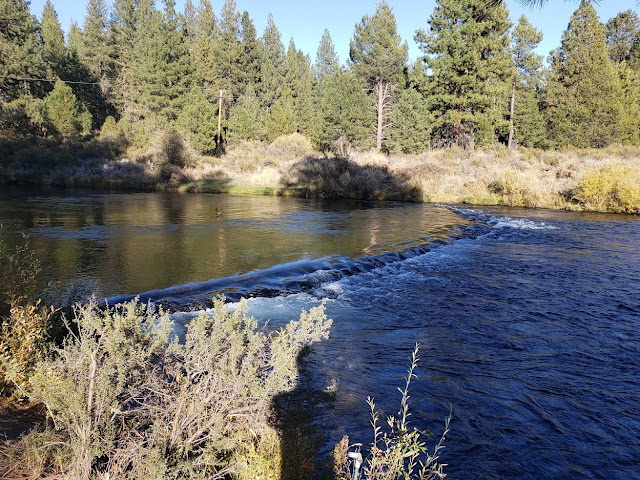Streams of Righteousness - A River Crossings Reflection (Amos 5)
 |
| Spring Creek, Collier Park, Oregon |
18 Alas for you
who desire the day of the Lord!
Why do you want the day of the Lord?
It is darkness, not light;
19 as if someone fled from a lion,
and was met by a bear;
or went into the house and rested a hand against the wall,
and was bitten by a snake.
20 Is not the day of the Lord darkness, not light,
and gloom with no brightness in it?
Why do you want the day of the Lord?
It is darkness, not light;
19 as if someone fled from a lion,
and was met by a bear;
or went into the house and rested a hand against the wall,
and was bitten by a snake.
20 Is not the day of the Lord darkness, not light,
and gloom with no brightness in it?
21 I hate, I
despise your festivals,
and I take no delight in your solemn assemblies.
22 Even though you offer me your burnt offerings and grain offerings,
I will not accept them;
and the offerings of well-being of your fatted animals
I will not look upon.
23 Take away from me the noise of your songs;
I will not listen to the melody of your harps.
24 But let justice roll down like waters,
and righteousness like an ever-flowing stream.
and I take no delight in your solemn assemblies.
22 Even though you offer me your burnt offerings and grain offerings,
I will not accept them;
and the offerings of well-being of your fatted animals
I will not look upon.
23 Take away from me the noise of your songs;
I will not listen to the melody of your harps.
24 But let justice roll down like waters,
and righteousness like an ever-flowing stream.
******
As my
River Crossings journey (sabbatical) nears its end, I continue to discover
texts and readings that are suggestive of what it means to walk in the presence
of God. I have reproduced a section of Amos 5, the final verse of which has
been often quoted regarding the importance of justice.
This
passage opens with a word about the Day of the Lord. It’s a word of warning—be
careful about what you wish for! The day of the Lord is not light but darkness.
In other words, it is a day of judgment. Amos speaks to the northern kingdom of
Israel in the 8th century in the days before the Assyrian invasion
destroyed that nation. While there are words here suggesting destruction, there
is also a word here about repentance. It speaks of what God is expecting of the
people. Not sacrifices, but justice and repentance. These are framed in terms
of water. Justice rolls down like water
and righteousness like an unfailing stream.
I was
drawn to this text as I was reading Rabbi Reuven Hammer’s A Year with theSages: Wisdom on the Weekly Torah Portion, (Jewish Publication Society,
2019). In his reflections on Leviticus 1-5, he speaks of the sacrifices and
their ending with the destruction of the Temple in 70 CE. He notes in his
commentary that in Israel’s understanding of the sacrifices, these were not for
God but for the people: “Sacrifices allowed them to feel close to the Divinity,
to offer thanksgiving, and/or to assuage feelings of guilt and attain
forgiveness.” [Hammer, A Year with the Sages, p. 124]. He goes on to say
that according to the prophets, sacrifices did not please God if they weren’t
accompanied by observing Judaism’s ethical teachings. This is where Amos 5
comes into play. The issue isn’t whether or not there should be sacrifices, but
their larger context of being attentive to God’s concern for justice and
righteousness. This vision was picked up by the Sages at the time of and after
the destruction of the Temple. For instance, Rabbi Yohanan ben Zakkai, who
helped organize the community at Yavneh after the destruction of Jerusalem,
suggested that charitable acts were an appropriate replacement for the Temple
sacrifices.
In the
concluding paragraph of his reflection on the text and on the word of the
Sages, Rabbi Hammer writes that it is unimaginable that Jews will return to the
sacrificial system (even though some groups agitate for it). He writes:
“Indeed, Judaism has always taught that God did not need sacrifices. Maimonides
saw them as a concession to human feelings, Rabbi Yohanan ben Zakkai said that
acts of loving-kindness were an adequate substitute, and the prophets viewed
them as less important than the pursuit of justice.” Then he concludes by
saying: “Perhaps, then, we can appreciate the vital role sacrifices played in
Judaism two thousand years ago without desiring to see them return.” [Hammer, AYear with the Sages, p. 128].
Ritual
has its place, perhaps even sacrifices, but ultimately justice and
righteousness are like unfailing streams. Thus, we hear our calling, which is
rooted in the ancient sacred texts. “But let justice well up like water,
Righteousness like an unfailing stream” [Amos 5:24, Tanakh]
Comments